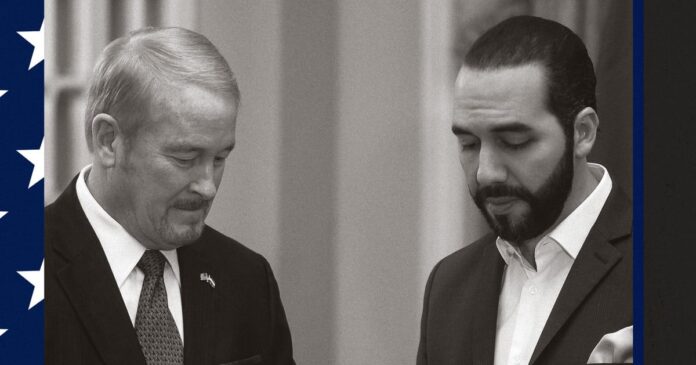Unmasking Power: The Intricate Ties Between El Salvador’s President Bukele and U.S. Diplomacy
This headline captures the essence of the article, emphasizing the complex relationship and the implications of power dynamics between Bukele and U.S. officials.
ProPublica Investigation Reveals Ties Between El Salvador’s President Bukele and U.S. Diplomacy
Date: [Insert Date]
By: [Your Name]
Source: ProPublica
In a groundbreaking investigation, ProPublica has unveiled a complex web of interactions between U.S. officials and El Salvador’s President Nayib Bukele, highlighting allegations of corruption, diplomatic favoritism, and a troubling alliance with the notorious MS-13 gang. This report draws on previously undisclosed documents and interviews with key figures involved in U.S.-El Salvador relations.
The Request for Dismissal
In August 2020, President Bukele approached U.S. Ambassador Ronald D. Johnson with a request that would have significant implications for U.S. law enforcement efforts in El Salvador. Bukele sought the dismissal of a U.S. embassy contractor who was collaborating with investigators probing corruption within Bukele’s inner circle. This contractor had played a pivotal role in uncovering a suspected alliance between the Bukele administration and MS-13, a gang responsible for widespread violence and crime in both El Salvador and the United States.
The contractor’s work had revealed that Bukele’s aides were allegedly negotiating with gang leaders in prison, offering financial incentives and protection in exchange for reduced violence. This information posed a direct threat to Bukele’s administration, prompting his request for the contractor’s removal.
Ambassador Johnson’s Role
Ambassador Johnson, a former CIA officer appointed by President Trump, had developed a close relationship with Bukele, which raised eyebrows among U.S. officials. Following Bukele’s request, Johnson ordered an investigation that led to the contractor’s dismissal, a move that many viewed as shielding Bukele from scrutiny. The contractor’s removal was part of a broader pattern of behavior by Johnson, who was accused of obstructing U.S. law enforcement efforts aimed at investigating Bukele’s administration.
After leaving his post, Johnson continued to support Bukele, even as the Biden administration sought to address concerns about Bukele’s increasingly authoritarian governance. Johnson’s close ties to Bukele were seen as instrumental in elevating the Salvadoran leader’s profile among Republican lawmakers, paving the way for controversial immigration agreements, including the deportation of immigrants to a Salvadoran megaprison.
The CIA Station Chief’s Dismissal
The investigation also revealed that Johnson’s relationship with Bukele created tensions within the U.S. diplomatic community. Biden’s envoy to El Salvador, Jean Manes, was forced to dismiss the CIA station chief, a Johnson ally, due to concerns that he was "too close" to Bukele. This dismissal was part of Manes’ efforts to realign U.S. policy towards a more critical stance on Bukele’s governance.
Manes’ review of the contractor’s dismissal concluded that Bukele had directly influenced Johnson’s decision, raising serious ethical questions about the ambassador’s actions. The inspector general’s report stated that Manes believed the contractor’s removal was a tactic to halt ongoing anti-corruption investigations.
The Gang Pact and Its Implications
The investigation also delved into the alleged secret pact between Bukele’s government and MS-13, which had reportedly resulted in a significant reduction in homicide rates in El Salvador. However, this apparent success came at a cost, as it involved compromising law enforcement efforts and undermining democratic institutions.
U.S. law enforcement agencies, including the FBI-led Joint Task Force Vulcan, were actively investigating these allegations. The task force aimed to dismantle MS-13 and hold accountable those within Bukele’s administration who were believed to be complicit in the gang’s activities. However, Johnson’s ambassadorship was marked by a reluctance to confront Bukele on these issues, as he prioritized immigration cooperation over addressing corruption.
A Diplomatic Crisis
The relationship between Johnson and Bukele became a focal point of contention within U.S. foreign policy circles. Critics argued that Johnson’s actions undermined U.S. interests and compromised the integrity of diplomatic efforts in Central America. The dismissal of the contractor led to a decline in cooperation between the U.S. embassy and Salvadoran anti-corruption prosecutors, further complicating efforts to address corruption in the region.
As tensions escalated, Manes was tasked with reassessing U.S. relations with Bukele’s government. Her findings led to a temporary pause in diplomatic relations, signaling a shift in U.S. policy towards a more confrontational approach.
Conclusion
The ProPublica investigation sheds light on the intricate dynamics of U.S.-El Salvador relations under the Trump administration and the implications of personal relationships in diplomatic decision-making. As the Biden administration grapples with the fallout from these revelations, the future of U.S. engagement in Central America remains uncertain.
For ongoing updates and in-depth analysis, sign up for ProPublica’s newsletter to receive our biggest stories as soon as they’re published.
